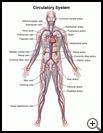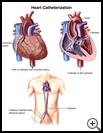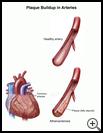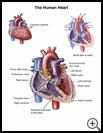
Chest Pain (Angina)
What is chest pain?
Chest pain caused by a problem with your heart is called angina pectoris or angina. Angina is often described as a feeling of tightness, squeezing, pressure, or pain in the chest. You may also feel short of breath. It happens when the heart does not get enough oxygen-rich blood. Angina may be caused by any condition that affects the blood flow to your heart, such as coronary artery disease, abnormal heart valves, abnormal heart rhythms, anemia, a major infection, or uncontrolled blood pressure.
What can I expect in the hospital?
Several things may be done while you are in the hospital to monitor, test, and treat your condition. They include:
Monitoring
- You will be checked often by the hospital staff.
- A heart (cardiac) monitor will be used to keep track of your heartbeat. If you have an irregular rhythm that might be dangerous, it will be treated right away.
- Your blood oxygen level will be monitored by a sensor that is attached to your finger or earlobe.
Testing
Testing may include:
- An ECG (also called an EKG or electrocardiogram), which measures and records your heartbeat.
- Blood tests to check for the amount of certain proteins in the blood to find out if the heart muscle has been damaged.
- A chest X-ray to check if your heart is bigger than normal and if there is extra fluid or other problems in your lungs.
- Ultrasound (echocardiogram), which uses sound waves and their echoes passed through your body from a small device that is held against your skin to create pictures of the inside of your heart, to look at your heart valves, blood flow, and how well your heart muscle is pumping.
- Heart catheterization (coronary angiogram), which is a series of X-rays taken after your healthcare provider injects contrast dye into your blood vessels to look for areas where the contrast dye may be leaking out of a blood vessel or blocked blood vessels.
- Stress test, which is an ECG while you exercise on a treadmill. If you are unable to exercise, you will be given a medicine that increases the work of your heart in order to measure your heart’s response. This test will help your provider decide what treatments and exercise are best for you or may be needed in the future.
- CT scan (computed tomography scan): A series of X-rays taken from different angles and arranged by a computer to show thin cross sections of your heart and blood vessels to look for blocked blood vessels.
Treatment
The treatment for chest pain depends on its cause, your test results, your overall health, and any complications you may have.
- You will have a small tube (IV catheter) inserted into a vein in your hand or arm. This will allow medicine to be given directly into your blood and to give you fluids, if needed.
- You may receive oxygen through a small tube placed under your nose or through a mask placed over your face.
- Your provider may prescribe medicine to:
- Relax and widen blood vessels and allow blood to flow through them easier
- Help prevent blood clots
- Reduce blood pressure, slow the heart rate, and reduce the workload of the heart
- Control cholesterol levels
- Your provider may recommend other types of therapy to help relieve pain, other symptoms, or side effects of treatment.
- You may need surgery to treat the cause of your chest pain. Surgery may include:
- Pacemaker insertion: Surgery to insert a medical device to help keep your heart rate stable
- Percutaneous coronary intervention (PCI): A procedure in which your healthcare provider inserts a flexible tube called a balloon catheter into a blocked artery in your heart to unblock it. It opens up your artery without major surgery and allows blood to flow. A metal mesh device, called a stent, is usually left in the artery to help keep the blood vessel open.
- Coronary artery bypass graft surgery (CABG): Surgery in which a blood vessel from another part of your body is used to create a new path for blood to flow around a blockage in a heart artery caused by coronary artery disease
What can I do to help?
- You will need to tell your healthcare team if you have new or worsening:
- Pain that is not well controlled with your medicine
- Chest discomfort when lying down
- Chest pain that gets worse or happens more often
- Shortness of breath
- Feeling like your heart is beating too fast, too slow, or skipping beats
- Swelling in your legs, ankles, or feet
- Nausea or vomiting
- If you had surgery, redness, swelling, pain, warmth, or drainage from your surgical wound
- Fever, chills, or muscle aches
- Ask questions about any medicine, treatment, or information that you do not understand.
How long will I be in the hospital?
How long you stay in the hospital depends on many things, such as your general health, why you are in the hospital, the treatment you need, and how well you recover. Talk with your provider about how long your stay may be.
Last modified: 2016-03-30
Last reviewed: 2015-05-01




